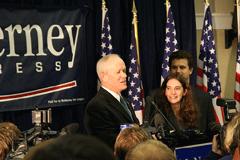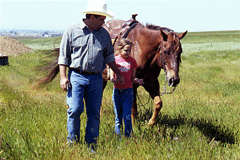The Election and the Environment
Air Date: Week of November 10, 2006

California Democrat Jerry McNerney beat Rep. Richard Pombo and celebrates his victory. (Photo: Nick Kocharhook)
Host Steve Curwood turns to Living on Earth’s Washington Correspondent, Jeff Young, and Western Bureau Chief, Ingrid Lobet to see how the chips fell, environmentally, in the midterm elections. Living on Earth goes beyond the major election headlines to look closely at state ballot initiatives that could have significant political and environmental consequences in the coming years.
Transcript
CURWOOD: From the Jennifer and Ted Stanley Studios in Somerville, Massachusetts, this is Living on Earth I’m Steve Curwood.
The midterm elections not only shift the balance of power to the Democrats in Congress they also shifted the political terrain in a number of state houses. And these changes might make America a little greener. California democrat Nancy Pelosi is poised to become the next speaker of the US House of Representatives. Tops on her agenda: clean energy alternatives to oil imports.
PELOSI: When we talk about reducing our dependence on foreign oil, when we talk about that we talk about alternative energy. It’s not just about drill, drill, drill.
CURWOOD: In this program we’ll look into whether the Democrats can deliver on their energy agenda as we look at the election and the environment, who’s out, who’s in and what they’re likely to do.
CURWOOD: Living on Earth’s Washington correspondent Jeff Young is with us. Hi Jeff.
YOUNG: Hi Steve.
CURWOOD: And from Los Angeles our West Coast bureau chief Ingrid Lobet, hello.
LOBET: Hi Steve.
CURWOOD: Let’s start in Washington with you Jeff, this election really shook the ground there. How does it change the landscape for the issues of the environment and energy?
YOUNG: I’d say the best way to put it is that, this is no longer just about playing defense on environmental issues. For years environmental battles here in Congress had been about stopping things: stopping the oil exploration in the arctic refuge, stopping offshore drilling, stopping changes to major laws like the clean air act and the endangered species act. Now those who are interested in a more environmental agenda, instead of stopping things they have a chance to try to start something. They get a chance to play a little offense for a change.
CURWOOD: And they’ve got two fields to play on there’s the House it was the Senate. What should we watch for there on the environment in the Senate?
YOUNG: Well, I would say keep your eyes on the Senate environment committee, a very big change in power. The chair of that committee will go from Oklahoma Republican James Inhofe to California Democrat Barbara Boxer. And I challenge you to find any two lawmakers who are more diametrically opposed when it comes to their view on the environment. These two pretty much define the opposite poles of thinking. One example that springs to mind is climate change.
CURWOOD: Yeah, Jeff I remember Senator Inhofe’s statement. He’s really outspoken as a climate change skeptic. So let’s just dip into the archives for a moment for a little audio from one of those hearings.
INHOFE: Let me just once again state my belief that global warming is an alarmism and it’s a type of a hoax. The climate alarmism we hear in the media about impending planetary doom has taken on a striking resemblance to the classic story of chicken little.
CURWOOD: So Senator Inhofe thinks global warming is a hoax. What about Senator Boxer?

California Senator Barbara Boxer will fight to keep environmental issues on the agenda as chair of the Senate Environment Committee. (Courtesy of United States House of Representatives)
CURWOOD: And in the House who are the key players there to watch?
YOUNG: I would focus on the resources committee. I think that’s the most striking change on the House side. West Virginia Democrat Nick Rahall is going to be taking over from California Republican Richard Pombo. That’s a major shift in the paradigm there. Pombo had pretty much become the boogey man for environmentalists. It seemed like just about any bill that would have environmentalists up in arms would have Mr. Pombo’s name on it. He tried to weaken the endangered species act, he wanted to drill for oil in the Arctic. He wanted more offshore drilling. He even once proposed selling off parts of national parks. Now Pombo’s out, not only did he loose the chair, he lost his seat, and pretty much all those ideas, I think, go out the door with him.
CURWOOD: So Ingrid, what happened in that race? You covered the Pombo contest.

Congressman Richard Pombo with his daughter. (Courtesy of Richard Pombo for Congress)
But most of all I think it’s what Jeff has been talking about. It’s Pombo’s outspokenness on the need to take on the nation’s most important environmental laws. He really led the charge against the environmental agenda you could say. And that made him the target of what I think may have been an unprecedented campaign at least for the group Defenders of Wildlife, which led the charge.
They decided they wanted to get this guy out. They spent more than a million dollars. They organized buses of people to go door-to-door in his district even some of them who lived outside the district. They spent all this money on TV ads. And I think they can take some credit for what is a pretty big defeat: a chairman with 7 terms in Congress.
YOUNG: And I’d add that the environmental groups here in Washington are not shy about taking credit for that. They’re flexing their muscles and saying, “This is a message to anyone who thinks about tinkering with environmental protection. If you take on environmental protections, we’re going to take on you.”
CURWOOD: Now, Ingrid who’s new in Congress from the West? As I understand it there are several new members who have strong environmental records. Who comes to mind?
LOBET: Yeah, some of them will be quite a striking contrast. I think many listeners will have heard that Montana’s chosen for the Senate John Tester, an organic farmer who grows lentils and peas and alfalfa and also speaks very skeptically about free trade. People in Southern Arizona just chose a 36 year old, a woman, to represent them. Someone, Gabrielle Giffords, who the Sierra Club calls an environmental champion. She has a record in her state legislature on water and climate change issues. She wants to pay people to defray the cost of putting solar panels on homes. She wants to increase mile standards for cars. And she also lists a new national commitment to addressing global warming as a priority for her. And then there’s the man who defeated Pombo, Jerry McNerny, he’ll be the first alternative energy expert in Congress. He’s a wind energy engineer. So little by little these changes alter the discussion on clean energy in Congress I think.

California Democrat Jerry McNerney beat Rep. Richard Pombo and celebrates his victory.(Photo: Nick Kocharhook)
LOBET: Yeah, it wasn’t strange that Governor Schwartzennager was reelected. Here moderate Republicans have often done well in California. We had Governor Pete Wilson, we had Governor Duke Majin. And once Governor Schwarzenegger moved toward more moderate stances in the latter part of his term, in particular championing climate change measures and really continuing to make California a leader on that issue there really wasn’t any doubt that he was going to win reelection. And that sort of Republican has always been popular in California.
YOUNG: You know there are moderate, pro-environment Republicans who are now saying, “Hey that’s the lesson from this election. We’ve got to start pushing that kind of pro-environment, Republican moderate candidate if we’re going to recover from this disaster on election night.” And presumably if they follow that route that makes the environment common ground for possible bipartisan action.
CURWOOD: Now, there was a multimillion dollar campaign to tax oil to finance alternative energy went down to defeat there, prop 87. What happened?
LOBET: That was, financially, I think the biggest campaign in the country this year, the largest initiative in California history. One of California’s most prominent environmentalists, Steven Bing, sunk 50 million dollars of his own money into this measure to tax oil companies and fund alternative energy. And the oil companies buried Bing’s money in 100 million dollars in TV ads against the tax. I caught up with Scott MacDonald, spokesman for the no side at the GOP election bash in Beverly Hills and he blamed this huge waste of money, I guess you could say, on the initiative’s backers.
MACDONALD: These people could have spent 57 million dollars on something constructive and they didn't and so they need to answer for that. We need alternative energy. We are all about alternative energy. It is not a vote on that.
CURWOOD: Now, how did voters respond to other initiatives involving the environment?
LOBET: Also on the clean energy front, in Washington State, that became the latest place to require that a portion of the state’s electricity come from renewable power: 15 percent by 2020.
Voters in several states decided to limit the government’s power to take private property for things like urban renewal when that property is going to be given over to another private party like a builder. And these measures were very successful, they passed in 9 states. But where voters were asked to pass something more sweeping, let’s say for example, your local government downzones you. They decide they no longer want 5-acre ranchetts in your area and you were planning to rely financially on subdividing your property into 5-acre parcels when you get older. Several measures around the West would have allowed you to collect money from the government for that loss of value but those measures tended to go down. They went down in California, Washington, even in Idaho, Steve, a very conservative state traditionally. But in Arizona voters said yes to that.
And in other environment-related initiatives in perhaps a pre-emptive move against animal rights activists Georgia voters decided to enshrine hunting and fishing in their constitution. And, Steve, in Arizona voters decided to possibly try to fend off factory farms by banning so called gestation crates for sows.
CURWOOD: Let’s go back to Washington for a moment, Jeff and back to the Congress. There’s another thing Democrats have criticized Republicans about and that is that there’s just not been enough oversight of environmental programs and agencies that special interests have been able to get in there and write the rules and do things that maybe put money into people’s pocket rather than protecting the environment. What are the Democrats going to do about this now that they’re in control of both houses of Congress?
YOUNG: Yeah, that has been a persistent theme that this was a rubber stamp Congress. They didn’t really exercise oversight. I think you can expect more vigorous oversight from people like Senator Boxer in the Senate’s environment committee. In the house energy committee keep an eye on John Dingell, the veteran Congressman is returning to that position that chairmanship that he had 12 years ago. And back then he was very famous as a very tough investigator. Really digging into what the Department of Energy and Environmental Protection Agency were up to. And then there’s the House Government Reform Committee. California Democrat Henry Waxman is taking over there. I think we’re going to see more hearings and more investigations into things like climate change, were scientists censored when they tried to ring the alarm bells on climate change. I think they’ll want to know more about how the rules were written on mercury emissions from power plants. How did the Bush Administration come up with its energy policy and who was holding the pen when these rules were written.
CURWOOD: So speaking about climate change for a moment, any chances we’ll see action on climate change with Democrats in the majority?
YOUNG: I think that you can say safely that there are now more votes in both the House and the Senate for a cap on greenhouse emissions. However, it’s still a steep uphill climb to pass any meaningful legislation until there’s a change at the other end of Pennsylvania Avenue. Until the White House signals that they’re ready to entertain this idea I don’t see those bills moving.
CURWOOD: Jeff Young is our Washington correspondent and Ingrid Lobet is our West Coast bureau chief. Thank you both.
YOUNG: You’re welcome
LOBET: You’re welcome
Links
Rep. Henry Waxman (D, CA-30) will soon led the House Government Reform Committee:
Barbara Boxer (D-CA) will lead the Senate Environment Committee
Living on Earth wants to hear from you!
Living on Earth
62 Calef Highway, Suite 212
Lee, NH 03861
Telephone: 617-287-4121
E-mail: comments@loe.org
Newsletter [Click here]
Donate to Living on Earth!
Living on Earth is an independent media program and relies entirely on contributions from listeners and institutions supporting public service. Please donate now to preserve an independent environmental voice.
NewsletterLiving on Earth offers a weekly delivery of the show's rundown to your mailbox. Sign up for our newsletter today!
 Sailors For The Sea: Be the change you want to sea.
Sailors For The Sea: Be the change you want to sea.
 The Grantham Foundation for the Protection of the Environment: Committed to protecting and improving the health of the global environment.
The Grantham Foundation for the Protection of the Environment: Committed to protecting and improving the health of the global environment.
 Contribute to Living on Earth and receive, as our gift to you, an archival print of one of Mark Seth Lender's extraordinary wildlife photographs. Follow the link to see Mark's current collection of photographs.
Contribute to Living on Earth and receive, as our gift to you, an archival print of one of Mark Seth Lender's extraordinary wildlife photographs. Follow the link to see Mark's current collection of photographs.
 Buy a signed copy of Mark Seth Lender's book Smeagull the Seagull & support Living on Earth
Buy a signed copy of Mark Seth Lender's book Smeagull the Seagull & support Living on Earth

